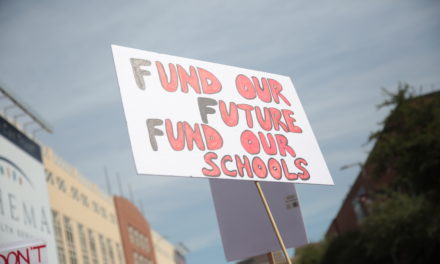On March 15, Texas officials announced plans to take over Houston’s public schools—the largest school system in the Lone Star State and the eighth largest in the nation. The takeover will put Texas Education Agency Commissioner Mike Morath in charge of Houston schools, the school board will be stripped of its authority, and a board of managers appointed by Morath will call the shots. Morath will also get to appoint a new superintendent.
This decision has enormous implications, not just for the students and parents that rely on the schools, but for the entire community.
Houston Independent School District (HISD) employs about 27,000 people, more than almost all other employers in the city, save Walmart. Nearly three-quarters of the district’s annual budget of $2.2 billion comes from property taxes that local businesses and households pay. And given that school quality is a major factor in determining property values and where families and employers nationwide decide to move or start a business, state takeover of Houston’s schools will remove public input from most, if not all, decisions that affect schools, including closures, personnel, budget allocations, and charter school expansions.
With the stakes this high, the rationale for state takeover of a local school system should be clear and compelling. In this case, the motivation behind replacing elected officials with a state-appointed board of officials isn’t.
While some have painted the move as a genuine and bipartisan effort to intercede on the behalf of “students,” other reports indicate a familiar political dynamic is unfolding: that is, Republican and predominantly white state officials are taking control of a non-white Democratic-led school district.
The Associated Press reports that a “six-page letter” composed by Morath accuses the district of various deficiencies including alleged “misconduct” by school board members. But it’s not clear which members committed the violations and when (the membership of the board has completely changed due to recent election outcomes).
Morath said board meetings had become “chaotic” and “marred by infighting,” but if enforcing calm and orderly school board meetings is his goal, he might want to look at those districts in his state where angry white people are interrupting board meetings with loud accusations of schools being hotbeds for “post-Marxist critical theory” and “antifa.”
Morath also accused the district of “failing to provide proper special education services and of violating state and federal laws with its approach to supporting students with disabilities” even though that’s been a statewide problem that’s not exclusive to Houston.
While local critics of the takeover plan admit that each of these explanations for the state’s actions has some level of credibility, they claim there’s a stronger motivating factor.
“This decision is driven by the urge to privatize a public school district,” says Ruth Kravetz, who spent thirty-four years in public education and now serves on the steering committee of a Houston-based education advocacy group called Community Voices for Public Education.
Kravetz describes an eight-year campaign conducted by state lawmakers and self-described “education reformers” to discredit the district and expand privately operated charter schools and voucher programs. Kravetz says the takeover effort began in 2015 when the state passed a law ruling that any school district can be subject to state takeover even if only one campus is rated F, for five years, by the state’s standardized test-based performance rating system.
The law was modified somewhat in 2017, according to Houston Public Media, to give districts an option of temporarily turning management of any low-performing schools to an outside group, such as “a nonprofit or charter school.”
Other urban school districts in Texas, such as Dallas and San Antonio, have faced similar threats of a state takeover, and have chosen to close their troubled campuses or hand them over to charter management organizations.
Any district facing a takeover threat has only two alternative options: close schools or privatize them—stacking the deck in favor of privatization.
Kravetz is skeptical that Houston’s state takeover has anything to do with academics or financial malfeasance. “Houston is a successful district without any financial impropriety,” she says, although she acknowledges there have been improprieties by individuals in the past that have since been resolved.
Indeed, according to the most recent state performance scorecard, Houston Independent School District has a B rating. Moreover, according to state ratings, 94 percent of the district’s 200 schools are rated A, B, or C.
The supposedly failing school at the center of the takeover is Phillis Wheatley High School. Wheatley triggered the first threat of state takeover in 2019 when the school earned an F rating on state performance rankings for the seventh consecutive year. Yet, since then, Wheatly has improved its state rating from a grade of F to C.
The district also has a AA-plus bond rating, which means its financials are high quality and pose a low credit risk.
A privatization agenda fits within the overall context of the state’s current education politics. Under the leadership of Republican Governor Gregg Abbott, Texas has become a breeding ground of school privatization efforts.
According to Carol Burris, the executive director of the Network for Public Education, a national group that is critical of privatization, “The [Houston] takeover is the latest move in a long list of actions by Abbott’s administration to attack public school districts and expand privatized alternatives including poorly regulated charter schools and now a proposed voucher program that would use public money for private and religious education.”
In an article for The Washington Post, Burris also points to the leadership history of Commissioner Morath, who, when on the Dallas school board, advocated for the district to “become a home-rule charter system,” which would have eliminated the elected school board and replaced it by a board appointed by the mayor.
Burris notes that local opposition to the Houston takeover is putting up a strong fight. “The first takeover forum sponsored by the Texas Education Agency, which Morath leads, was described in The Houston Chronicle as ‘emotional and chaotic,’” Burris writes. “The Greater Houston Coalition for Justice [planned to lead] a protest march before another TEA hearing. U.S. Rep. Sheila Jackson Lee (D), who represents the city, has asked the Biden Administration to open a civil rights investigation into the takeover.”
Since Burris’s article ran, Lee has also announced she will be a candidate in Houston’s upcoming mayoral election. In a “day of action” to protest the takeover, Kravetz’s organization staged “dozens,” according to the Houston Chronicle, of rallies, walk outs, and other actions at schools across the district. And “hundreds of students” at one Houston high school walked out to protest the takeover according to Houston Public Media.
Kravetz would prefer Texas state officials take a different approach to improving the schools: “If the governor really wanted to improve schools, he would ensure they are adequately funded, that schools had smaller class sizes, and that teachers had positive work environments.”
But instead of improving schools, Kravetz fears that the state’s intentions to privatize them will worsen the inequalities the district is already accused of having. “The most likely outcome of this takeover,” she says, “is that the district’s lowest rated schools will be taken over while the schools that wealthier families attend will be left alone.”






Recent Comments